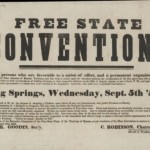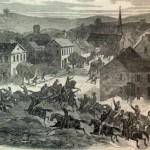In the 1830s, Lawrenceburg, Indiana, was a bustling trade town located on the banks of the Ohio River. It boasted two brick churches and could almost rival Indianapolis in size.
Son of an acclaimed Boston preacher and brother of the woman who would write Uncle Tom’s Cabin, Henry Ward Beecher arrived in Lawrenceburg in 1837. Unaffected by his prestigious family name, the congregation of Lawrenceburg’s First Presbyterian Church had unanimously called Beecher as their preacher after a brief trial period.
Beecher used his two years in Lawrenceburg to refine his pulpit practices and nurture his small family before moving to Indianapolis in 1839. In that city’s Second Presbyterian Church, the minister held his first revivals, and solidified his antislavery stance.
The work that would define his career and boost him to national prominence would be done later. Beecher accepted a call to New York in 1847, hoping that by moving back East his wife might escape the illnesses that plagued her in the wilderness. At Brooklyn’s Plymouth Church, Beecher drew immense crowds to his mock slave auctions. Still later, President Abraham Lincoln would call Beecher to serve as a Union ambassador to Great Britain during the Civil War.
Although his Indiana years were darkened by financial woes and the deaths of several infant children, Beecher later recalled his Hoosier period as the foundation of his career.
This script draws from the following source:
Elsmere, Jane Shaffer. Henry Ward Beecher: The Indiana Years 1837-1847. Indianapolis, IN: Indiana Historical Society, 1973.






















